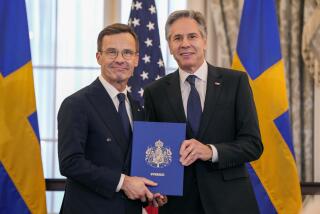Finnish Voters Approve Joining the European Union : Politics: Referendum result changes nation’s Cold War status as buffer between East and West. Sweden, Norway vote next.
- Share via
HELSINKI, Finland — Finnish voters Sunday gave a clear “yes” to European Union membership in a development that will alter the political map of Europe and open a new era for Finland.
After a long, intensely debated campaign, Finns voted 57% to 43% in favor of joining the EU in January under terms negotiated by the Finnish government earlier this year.
It was only the second national referendum in the country’s history (the first, in 1931, repealed prohibition) and was widely perceived as the most important single decision the Finnish electorate has ever been asked to decide.
The result reduces a mandatory parliamentary vote on the issue to little more than formality.
“For the first time ever, the Finnish people have decided for themselves which road the country should follow at this crucial stage in the history of our continent,” Finnish President Martti Ahtisaari said in a televised address to the nation. “The result is politically and morally binding on the Parliament, the president and the government.”
*
Sunday’s vote brings the Nordic nation of 5 million people into the mainstream of European political events for the first time, effectively ending its long and unique Cold War role as a buffer between East and West.
As such, Sunday’s result marks one more step in the gradual dismantling of the order that shaped Europe for 4 1/2 decades between the end of World War II in 1945 and the collapse of communism in 1989.
The Finnish “yes” vote carries other important ramifications for Europe. Among them:
* It radically alters the geography of the European Union, extending its borders well into the Arctic for the first time and giving it its first common frontier with Russia, a border running for more than 700 miles.
* Together with Austria, which voted to join in a referendum in June, it provides an important psychological boost for advocates of a more unified Europe.
* It heightens the prospects that Sweden and Norway might vote to join the EU in similar referendums scheduled for next month, and the prime ministers of both countries welcomed the Finnish result, saying they hoped that it will encourage a “yes” vote in their nations.
The Austrian and Finnish votes were purposely scheduled first in hopes of undercutting opponents of EU membership who have a far stronger base in Sweden and Norway.
A “yes” vote in all four nations would boost the number of nations in the EU from 12 to 16, increase its land mass by half and add 25 million consumers and $500 billion to the annual gross domestic product of what is already the world’s largest, richest single market.
More important for American exporters, the addition of a group of traditionally free-trading nations would tilt the balance of power within the EU, where debates on greater openness on trade issues have traditionally split between the more liberal northern countries and those in the Mediterranean south that tend to advocate more restrictive policies.
Interviews outside polling stations in suburban Helsinki indicated that, despite the clear “yes” majority, many had agonized until the last minute before making their decision.
“I thought about it a lot last night, and this morning I still didn’t know, but in the end I voted yes,” said Birgit Lindstroem, a retired librarian and a member of the country’s Swedish minority. “It’s better for Finland because we won’t be alone.”
While nearly half of Finland’s trade is with the nations of the EU, pure economic factors seemed to play a secondary role in the Finnish decision.
Instead, it was the issue of national security that seemed to be decisive.
The EU, with its commitment to developing a common foreign and security policy, seemed to offer a rare chance to escape Russian influence for a nation that has lived in Moscow’s orbit for most of the last two centuries.
“It’s politics and security that’s driving us,” said Hannu Olkinoure, editor of the country’s largest business newspaper, Kauppalehti. “Something in me says there is a certain momentum, a chance for us to point out that we belong to the Western Hemisphere before Russia gets stronger.”
More to Read
Sign up for Essential California
The most important California stories and recommendations in your inbox every morning.
You may occasionally receive promotional content from the Los Angeles Times.













